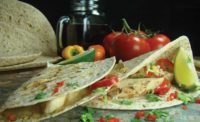Tortilla chips and tortillas are as American as they come—even though they are, of course, of Mexican origin. Manufacturers are putting their own spin on new products to entice consumers to buy more, and also to keep the category fresh.
Top trends
Tortilla and tostada chips sales remain strong, up 3.66 percent to $5.2 billion, per IRI, Chicago for the last 52 weeks ending March 25, 2018. Frito-Lay’s Doritos brand dominates this segment of salty snacks, up 5.55 percent to $2.2 billion and 42.20 percent share of the market; all Frito-Lay tortilla chip brands together account for 72.34 share of market.
Barcel USA—a business unit of Grupo Bimbo—sits at second in the category, thanks to its popular rolled tortilla chip brand Takis, and saw $329.3 million in sales, up 18.12 percent, illustrating the power of unbridled, bold flavors.
Organic shows considerable promise in tortilla chips, and Late July—our 2018 “Snack Producer of the Year”—was up 225.60 percent to $18.2 million for the period.
Sales of hard/soft tortillas and taco kits continue to trend forward. The segment was up 3.05 in dollar sales for the period, accounting for $2.5 billion in revenue. Mission Foods leads the segment and was up 6.09 percent to $786.1 million, with 31.98 percent market share.
“In general, people are snacking more,” says Dave Tessier, special products and marketing research manager, Wire Belt Co. of America, Londonderry, NH. “For tortilla chip producers, this means coming up with new and innovative products that are competitive against other snack options, including chips, pretzels and popcorn. New popular offerings include rolled tortilla chips, restaurant-style and flavored.”
In May of this year, Taco Bell will be releasing Classic, Mild and Fire versions of its tortilla chips, with pictures of its sauce packet designs on the packaging. Another restaurant brand, On the Border, released its Taste of Tajín Clásico tortilla chips in March, in Chili & Lime flavor.
Consumers are also interested in snacks that provide health benefits. “Interest in healthier snacking options is a key factor, and we see consumers seeking out products with better-for-you, non-GMO and organic claims. Oils like non-GMO sunflower or canola appeal to these health- and label-conscious consumers,” remarks Jana Mauck, senior marketing generalist, Global Edible Oils Solutions, Cargill, Minneapolis.
“There is growing demand for organic and non-GMO ingredients, as well as products made with more nutrient-dense inclusions like chia seeds, quinoa, kale seeds, flax, brown rice, sprouted seeds and plant-based flours or pulses,” says Ashley Robertson, market manager, Corbion, Lenexa, KS.
For tortillas, clean label is the buzz. “Clean label and other on-trend attributes are desirable to consumers across the food industry,” according to Mark Stavro, senior director of marketing, Bunge, St. Louis. To meet this trend, Bunge offers Honestly Corn functional flours through its Whole Harvest line. “Honestly Corn functional flours deliver great functionality as a replacement for modified starches, gums and alginates, but with a cleaner label. Tortilla manufacturers can replace these complicated texturizers with Honestly Corn and call it ‘corn flour.’”
Starting this year, the use of partially hydrogenated oils (PHOs) is forbidden by FDA, and bakeries have had to adjust their processes and transition to non-PHO varieties, says Oscar Carreon, development and technical service manager, AB Mauri North America, St. Louis.
Other reformulation efforts focus on clean label. “Replacing chemical preservatives and emulsifiers with more label-friendly alternatives and consolidating or reducing items on ingredient labels is becoming more prevalent in the tortilla industry today,” says Carreon.
But R&D isn’t just focusing on what they can take out. Often, it’s what you can add that generates shopper interest. In March, Angelic Bakehouse released a line Sprouted 7 Whole Grains Veggie Wraps, made with the company’s sprouted whole grain blend. Varieties include Beet, Sweet Potato and Kale & Spinach.
Nicholas Arens, product application technologist, Bay State Milling Co., Quincy, MA, suggests using legumes and pulses in tortillas. “Legumes and pulses such as lentils, pea and garbanzo bean flours can be used in tortillas to boost the protein and nutritional quality of a fresh flour tortilla.”
Building shopper appeal
“Consumers are looking for upscale products that are considered to be healthy and are deemed more authentic,” says Carreon. But taste cannot be neglected. “Finished tortillas must offer satisfying flavors and perceived health benefits to satisfy consumer demand.”
Carreon suggests offering healthier options, such as low-carb tortillas, as a way to bring some consumers back to tortillas.
“Shoppers want consistent flavor, texture and tasty overall eating quality,” says Steve McIver, tortilla and flatbread specialist, Brolite Products, Streamwood, IL. “There are more grains and seeds being used in upscale products, not only to offer variety, but to add healthy benefits.”
Shoppers are also drawn to foods that have a “story,” says Don Trouba, senior director, go-to market, specialty, The Annex by Ardent Mills, Denver. “There is an allure to trying foods that were popular more than 100 years ago—foods with a story. Ancient and heirloom grains have a history, a locality and an ethnic tradition that many consumers find simple, comforting and reassuring.”
Better-for-you has driven innovation in the tortilla chip industry, with ancient grains, blue corn, or non-traditional starches like potato and rice going into the mix, Tessier says.
For tortillas, bakers want to retain the “fluffiness” in packaged corn and wheat tortillas, says Steven Mallory, senior application specialist, bakery, DuPont Nutrition & Health, New Century, KS. “Tortilla producers are always looking to improve these qualities through ingredient or processing changes. Keeping a tortilla soft, resilient and flexible, while also retaining enough strength to avoid breaking when filled, is an ongoing challenge.”
Even achieving a clean-label tortilla can be a challenge, says Jeff Billig, vice president and general manager, Delavau Food Partners, Philadelphia. “Achieving a clean label remains challenging for tortilla bakers, as good-quality flour tortillas depend on a careful balance of multiple ingredient and process interactions to achieve optimum characteristics.”
New R&D resources
“The key for better-for-you tortillas and chips is to focus on selecting whole grains that can deliver taste and broad marketing appeal,” says Trouba. “Tortilla manufacturers need to know that it’s possible to select whole grains that deliver mainstream appeal.”
Trouba suggests White Sonora wheat, available in kernel and flour form. “White Sonora is an heirloom wheat with a buttery yellow color and a sweet flavor, making it ideal for many recipes. It makes a stretchy dough perfect for tortilla-making. We also offer crisps and new IQF formats in our ancient and heirloom grains.”
Another option, especially in the K-12 school foodservice segment, would be Ultragrain white whole wheat flour, a go-to ingredient for companies making whole-grain school foodservice products, says Zachery Sanders, marketing director, Ardent Mills. “It works very well for tortillas.”
Dough conditioners and improvers are also important for tortillas. The Encore systems from Delavau Food Partners help tortilla manufacturers make finished products that meet consumer quality requirements by delivering a cleaner label without affecting manufacturing throughput.
“Our solutions allow for tortillas that retain texture longer, reducing cracking and promoting rollability, all while retaining a clean label,” says Billig.
AB Mauri also has recently introduced new tortilla ingredients to its Supremo branded lineup, including Supremo Masa Relax, an enzyme-based dough conditioner, and Supremo Non Stick, an anti-stickiness solution for wheat tortillas. The company also offers Supremo Soft, an enzyme-based shelf-life extension system designed exclusively for wheat tortillas, and Supremo Corn Flex, a shelf-life extender intended for corn-based tortillas, says Carreon.
One issue that has arisen in the wake of removing PHOs from tortillas is stickiness, says Mallory. “As the consumer would remove a tortilla from a stack, it would stick to the next tortilla, tearing both and resulting in huge waste. This was especially common in foodservice tortillas, which can be exposed to more extreme handling conditions.”
The solution for this has been for DuPont Nutrition & Health to work with producers to finely adjust emulsifiers and enzyme levels for specific formulas, while using a common fat or oil which may have a low level of emulsifier added to it, notes Mallory.
Another approach is using Corbion’s Southern Tortilla 2.0, designed for manufacturing tortillas with maximum flexibility and very little translucency, which helps greatly reduce stickiness and extends shelf life, says Robertson.
Brolite’s dough improvers, for both corn and flour tortillas, can extend the shelf life and improve handling qualities in both retail and foodservice tortillas, explains McIver. “Brolite will work with you and your bakery from the beginning to the end to ensure you have a dough improver that works the way you want it to work.”
For tortilla chips, Ingredion launched its PRECISA Crisp series to build enhanced textures, optimal expansion and reduced breakage, says Ricardo Rodriguez, marketing manager, confectionary and bakery, Ingredion Inc., Bridgewater, NJ. “The texturizer series provides a range of expansion and textures in snacks, from light and crispy to hard and crunchy, allowing developers to create unique and differentiated snacks.”
Equipment that produces tortillas and tortilla chips are always evolving. JC Ford, La Habra, CA, is constantly making larger machines to manufacture more product in a smaller space, says Mike Minidis, sales engineer. “Essentially, with the push of a button, thousands of pounds of product is transformed into tortillas and tortilla chips, with minimal to no effort for the operators. We design our machines within a budget to ensure that clients can easily earn a profit, and we have a lot of proprietary operations that JC Ford does to prolong the life of the equipment.” He notes that a new machine for the wheat flour tortilla market is currently in development.
Wire Belt Company of America’s conveyor belts are a key component in the tortilla industry, says Tessier. “On the whole tortilla or burrito shell production side, Wire Belt’s stainless steel Flat-Flex, Flat-Flex XT, and TC327 conveyor belts are used extensively on cooling lines due to its open mesh design.”
In general, open mesh stainless conveyor belts reduce unwanted moisture retention from sweating and lack of airflow due to their large percentage of open area, says Tessier. “Wire Belt’s TC327 product line was developed exclusively to meet the needs of tortilla processors with demanding multi-tier cooling lines, reducing total cost of ownership and downtime.”
On the tortilla chip side, Wire Belt’s positive-drive stainless steel Compact Grid conveyor belt offers a solution for chips and other snacks by providing product support down to a 3/8 x 3/8 belt opening, while maintaining airflow.
Thanks to high shopper interest in tortilla chips and tortillas, new ingredients and equipment will continue to hit the market, expanding the boundaries of innovation and challenging our conceptions of the category. “These new product innovations have captured consumer interest and expanded the definition of a tortilla chip beyond a corn or flour product,” says Tessier.







